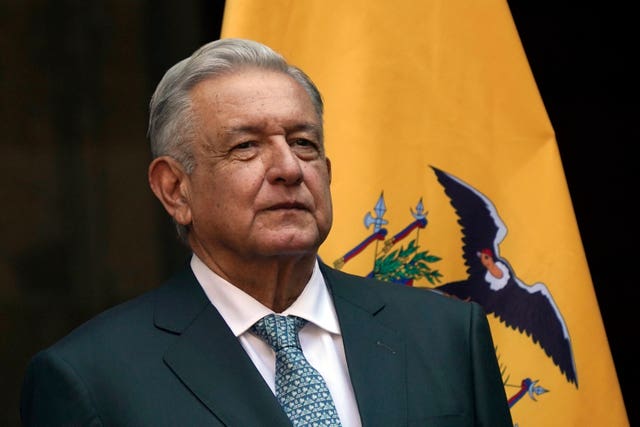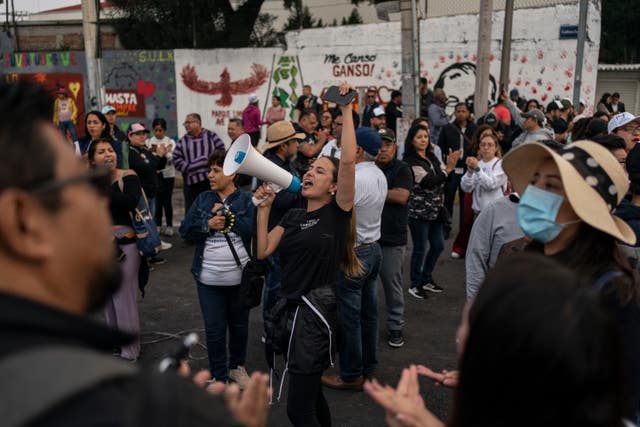Mexican protesters block Congress over judicial overhaul
The overhaul has fuelled a wave of protests by judges, court employees and students across Mexico in recent weeks.

After protesters blocked the entrance to Mexico’s Congress on Tuesday in an attempt to stop a controversial judicial overhaul, lawmakers took the first steps to jam through the proposal at a nearby gymnasium.
The plan would make judges stand for election, something critics say would deal a severe blow to the independence of the judiciary and the system of checks and balances.
The overhaul has fuelled a wave of protests by judges, court employees and students across Mexico in recent weeks, and reached another inflection point on Tuesday when protesters strung ropes across entrances to the lower house of Congress to block legislators from entering. That came as the country’s Supreme Court voted 8-3 to join strikes, adding more weight to the protests.
“The party with the majority could take control of the judicial branch, and that would practically be the end of democracy,” said protester Javier Reyes, a 37-year-old federal court worker. “They want to own Mexico.”
Despite that, lawmakers from Mexico’s governing party, Morena, and their allies appeared determined to quickly pass the reform.

The proposal was met by hours of fierce debate on Tuesday night after workers laid out grapes, juices and other snacks in a congressional session reminiscent of a summer camp.
As Morena politicians said they were building a justice system that would be an example globally, opposition lawmakers from the National Action Party (PAN) railed on the governing party.
“We should inaugurate a wall of shame that says: ‘Today begins the fall of our Republic.’ And it should have the date and all the faces of the Morena congressmen,” shouted Paulina Rubio Fernandez, a PAN congresswoman, surrounded by other members of her party.
Rubio Fernandez accused the president and his party of “lying” to get a majority in Congress, while another colleague in her party warned Morena was “shooting itself in the foot” by passing the reform.
Outside, a pack of protesters roared, blocking streets and demanding lawmakers hear their objections to the proposal.
The constitutional reforms submitted by outgoing president Andres Manuel Lopez Obrador and Morena have drawn criticism both domestically and from foreign governments and investors.
Mr Lopez Obrador, a populist who has long been at odds with the judiciary and other independent regulatory agencies, maintains the proposal is necessary to fight corruption.
Critics say the overhaul would stack the courts in favour of Mr Lopez Obrador’s party, politicise the judicial system and pose a threat to foreign investment.
Under the current system, judges and court secretaries, who act as judges’ assistants, slowly qualify for higher positions based on their record. But under the proposed changes, any lawyer with minimal qualifications could run, with some candidacies decided by drawing names from a hat.
The Morena party has the two-thirds majority in Congress needed to approve the reforms, which they should be able to do handily in the lower house of Congress.

Mr Monreal told lawmakers they were in for a long night on Tuesday.
Mexico’s courts have long been plagued by corruption and opacity, but in the last 15 years they have been subject to reforms to make them more open and accountable, including changing many closed-door, paper-based trials for a more open, oral-argument format.
Voices both at home and abroad say the new changes could mark a setback in the effort to clean up courts.
The proposed changes would cover about 7,000 judges at various levels and would introduce a time limit for judges to rule on many cases to combat a tendency for some trials to stretch out over decades.
More controversially, the reforms would also introduce “hooded judges” to preside over organised crime cases; their identities would be kept secret in order to prevent reprisals.
And the courts would be largely stripped of their power to block government projects or laws based on appeals by citizens.
It would also almost certainly assure that the president’s party continues with significant political power long after Mr Lopez Obrador leaves office at the end of this month.





